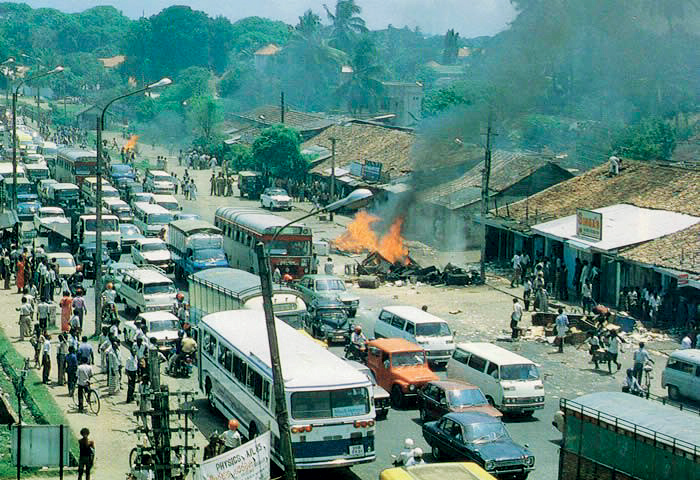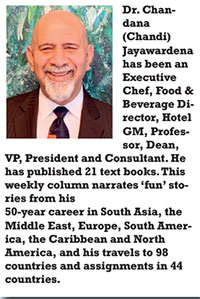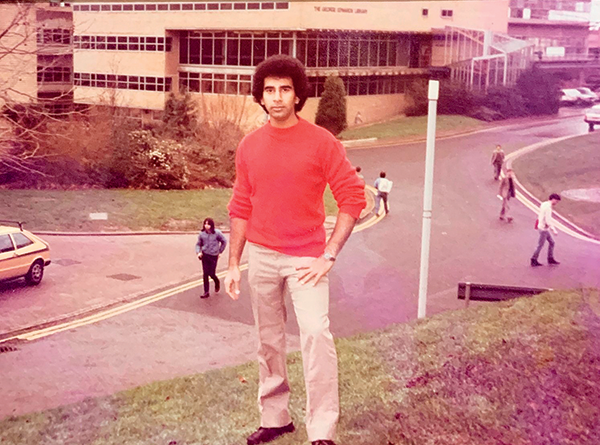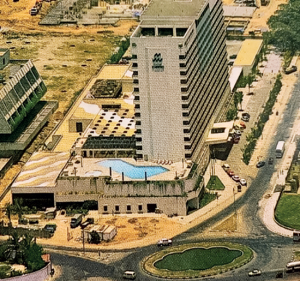Features
DEALING WITH UNUSUAL CHALLENGES

CONFESSIONS OF A GLOBAL GYPSY
By Dr. Chandana (Chandi) Jayawardena DPhil
President – Chandi J. Associates Inc. Consulting, Canada
Founder & Administrator – Global Hospitality Forum
chandij@sympatico.ca

Plans Working
Having commenced three semesters prior, my studies at the University of Colombo (UoC) to earn an Executive Diploma in Business Administration (EDBA) were working well as I had planned by mid-1983. Successful completion of the EDBA was a prerequisite for me to be accepted to the first batch of the world’s first master’s degree (M.Sc.) in International Hotel Management, at the University of Surrey (UoS) in the United Kingdom.
My plan was to pass all EDBA final examinations scheduled in late July and early August, 1983, and then proceed to UK before the M.Sc. commenced in September. I organized a study group of four like-minded students (an engineer, an accountant, a marketer and myself) from the EDBA program. We all worked hard and balanced busy professional and personal lives with our studies. Those days, I only needed an average of four hours of sleep to be rested enough to handle all my many tasks. All were set for success until the ugly head of racial violence in Sri Lanka rose again.
Black July of 1983
There had been growing tension between some groups of the Sinhalese and Tamil communities of Ceylon since 1956 when the then government of Ceylon, introduced the ‘Sinhala Only Act’ for political gain. The justification for this selfish act was what some Sinhalese leaders described as resolving a prolonging imbalance in the civil service and other professions. This was a result of the ‘Divide and Rule’ strategies of the British colonizers. There were ugly ethnic riots and disruptions in Sri Lanka in 1958, in 1977 and again in 1981.
A deadly ambush by a Tamil militant group – Liberation Tigers of Tamil Eelam (LTTE) on July 23, 1983, caused the death of 13 Sri Lanka Army soldiers. That triggered island-wide riots, initially orchestrated by some leading politicians, but soon becoming like the monster created by Frankenstein. The pogrom eventually escalated into mass violence with significant and shockingly high public participation. The Black July riots, which resulted in hundreds of deaths and the exodus of thousands of Tamils from the country, was among the darkest chapters in the contemporary history of Sri Lanka.
From Black July 1983, a bloody civil war continued in Sri Lanka for 26 years, costing the lives of over 57,000 in the battle fronts and by frequent terrorist suicide bombings. An Indian Prime Minister, a Sri Lankan President, and over a dozen key political leaders of Sri Lanka were assassinated by the LTTE. Thirteen years after that, on January 31, 1996, during the LTTE suicide bombing of the Central Bank of Sri Lanka killing 91 people, I nearly lost my life.
Plans Destroyed
Witnessing some deadly and totally cruel acts, where I lived in the Colombo District, I was deeply saddened, disappointed and disgusted. My personal plans were also destroyed. There was frequent civil unrest, states of emergency and curfews, (as Sri Lanka once again has been experiencing in the year 2022). UoC closed and examinations were postponed, indefinitely. I felt a large dark cloud over our heads, dooming Sri Lanka as well as my plans to progress in my chosen profession.

Eventually, when UoC announced the dates for delayed examinations, it was too late for me to get accepted into the M.Sc. program in UoS. The deadline for me to successfully complete the EDBA, and remit full fees to UoS was August 1983, as their program was scheduled to commence in UK by the end of September. According to the new schedule of UoC, the EDBA examinations were to end on October 20, with results taking another 30 days to be finalized!
There was no light at the end of the tunnel for me. My family suggested that I change my plans and join the second M.Sc. batch in 1984. I was defiant and determined to maintain my original goal. “If there is a will, there will be a way!” I told my family, and thought outside the box. I called Professor Bertram Bastianpillai, the UoC Dean in charge of the EDBA program at his home, and explained my dilemma. As a new mentor of mine, who was fond of me, he clearly knew of my ambitions, and was very supportive. However, as a Tamil gentleman, he was staying at home without going to UoC for safety reasons.
“Chandana, I would like to help you, but as my car is marked by thugs outside the university, I don’t want to drive to UoC from my house in Colombo-6.” Professor Bastianpillai told me. We then agreed for me to pick him up from his home and drive to UoC in my car. During our 15-minute drive, in spite of being worried about his safety, he was always encouraging me. He told me how much he enjoyed his days in UK during his Ph.D. studies at the University of London. He also told me how he worked as a porter at the Victoria train station in London, during his doctoral student days. In his office at UoC, he did something that most academic leaders won’t do.

His urgent fax to UoS, stated: “Chandana Jayawardena is one of our best students. Given the unfortunate current situation in Sri Lanka, the University of Colombo was compelled to postpone all examinations for ten weeks. This means that Mr. Jayawardena will be late by a month to join your program. Judging from his outstanding performance during the mid-term examinations and projects, I have no doubt that Mr. Jayawardena will do well at the final examinations in the Executive Diploma in Business Administration programme. He is determined to catch up the studies of the missed month, at the University of Surrey, within a few days of his arrival in the United Kingdom.” Purely based on that unprecedented vouching expressed in his fax, I was admitted to the M.Sc. program in UK, one month late, pending the EDBA results. Thank you, Professor Bastianpillai. RIP!
All In for the Future
Although, UoS, allowed me to join the M.Sc. program one month late, they included a strict condition. When UoC finalized the grades for the EDBA program, I was required to pass all courses above average. UoS letter of acceptance clearly indicated that; otherwise, I would be removed from the M.Sc. program. In that scenario, I would have lost financially (university fees, two air tickets for my wife and me, rent in UK, etc.) as well as, my reputation. Nonetheless I gambled and took a chance.
After converting all of my savings from mediocre Sri Lankan salaries over the previous nine years to pay my university fees in Sterling Pounds, I was still short. To bridge the gap, I sold my old car and took a loan from my father-in-law. My wife left her job in Colombo, and we were prepared to throw everything into the effort. As the spouse of a full-time international student in UK, my wife was authorized to work full time. The British High Commission in Colombo informed me that I too could work part-time. We planned our UK living budget, based on the assumption that we would find work in London, easily and quickly. We were willing to do any type of work. Although, we were a little nervous to be totally out of our comfort zone, we were optimistic and liked the challenge. We reckoned that unless we try, we would never make it.

Advice by Four Mentors
Throughout my career, I was fortunate to have excellent mentors. In 1983, prior to my departure to UK, four of them gave me some useful advice.Pearl Heenatigala, Director/Principal of the Ceylon Hotel School (CHS), thanked me for my service as a Senior Lecturer of CHS. After saying goodbye, she surprised me with some parting words. “Chandana, after you complete your masters, why don’t you re-join CHS as the Vice Principal?” We agreed to keep in touch.
Professor Bertram Bastianpillai advised me to join a Ph.D. Program soon after completing the M.Sc., while focusing on an academic career in a university. “There are no hoteliers with doctoral degrees in the world, outside of the USA, and you will do well with such a qualification.” He planted a seed in my mind.
Stefan Pfeiffer, the German national who was named the hotel opening General Manager of the Galadari Meridien Hotel contacted me, before my departure from Sri Lanka. I knew him when he was the General Manager of Hotel Lanka Oberoi in the late 1970s. He returned to Sri Lanka during the pre-opening year of the Galadari, the only hotel in Sri Lanka to open with 500 five-star rooms. Although I never worked with him, he was keen that after my studies in UK, I join the Galadari. We agreed to keep in touch. When I returned to Sri Lanka, he offered me a middle management position at the Galadari which I did not accept. Eventually, I joined his team as a senior manager and worked with him for a short period of time in 1986.
Malin Hapugoda (Hapu), then the General Manager/Director for Ceylon Holiday Resorts Limited, and a former boss of mine, called me the day before I left Sri Lanka. “Chandana, when will you be back in Sri Lanka?” he asked. When I told him that I may be back within two years, he made an open-ended offer to me. “The new Coral Gardens Hotel will be opened in 1985 with 156 rooms. I would like you to open this four-star hotel as the Manager. The job is yours. Call me when you return.” I was most grateful to Hapu for such an offer.

Considering Options for the Future
I was very pleased with the offers and suggestions from my mentors. However, I wanted to keep my options open without committing to anything concrete. I also wanted to find useful part-time employment during my graduate studies in UK, which was the most important next step to have a positive cash flow while in UK. I was hoping to explore opportunities with the world’s largest hotel and catering company at that time, Trust House Forte Hotels in UK, where I worked as a Management Trainee in 1979.
Just before my departure to UK, I heard that Taj Hotels of India recently acquired two hotels in London. Taj group had just opened a five-star hotel in Colombo – Taj Samudra. I immediately asked for an appointment to meet the General Manager of this hotel, and managed to meet with an Indian national, Yezdi Kathrak, who was the Resident Manager of Taj Samudra. He was very helpful, and gave me a letter of introduction to the General Manager of Baily’s Hotel in London, then owned and managed by the Taj Hotels. That letter resulted in securing my first part-time job in London, in 1983.
My First Good Bye to Sri Lanka

Between 1979 and 1982, doing five overseas trips covering 20 countries was fun. My departure from Sri Lanka in 1983, however, was very different. We were leaving our birth country for a longer period of time, without any clear plans to return after a couple of years. The civil war that had started in Sri Lanka, made the uncertainty greater. Peace and stability are essential prerequisites for tourism and for those who are employees in this global industry.
In the early 1980s, we led a very busy life, professionally and socially. Therefore, my good bye round included, meetings with an unusually large number of people. I said good bye to members of the family, my students, work colleagues at CHS, fellow students of UoC and the Tourist Guide Lecturer program, business associates of Streamline Services (Pvt.) Ltd., where I was a director, my clients whom I served as a consultant, fellow office bearers of the Ceylon Hotel School Graduates Association, TV commercial producers and fellow national Judokas. On October 22, 1983, we left Sri Lanka after an emotional roller coaster.
Features
The heart-friendly health minister

by Dr Gotabhya Ranasinghe
Senior Consultant Cardiologist
National Hospital Sri Lanka
When we sought a meeting with Hon Dr. Ramesh Pathirana, Minister of Health, he graciously cleared his busy schedule to accommodate us. Renowned for his attentive listening and deep understanding, Minister Pathirana is dedicated to advancing the health sector. His openness and transparency exemplify the qualities of an exemplary politician and minister.
Dr. Palitha Mahipala, the current Health Secretary, demonstrates both commendable enthusiasm and unwavering support. This combination of attributes makes him a highly compatible colleague for the esteemed Minister of Health.
Our discussion centered on a project that has been in the works for the past 30 years, one that no other minister had managed to advance.
Minister Pathirana, however, recognized the project’s significance and its potential to revolutionize care for heart patients.
The project involves the construction of a state-of-the-art facility at the premises of the National Hospital Colombo. The project’s location within the premises of the National Hospital underscores its importance and relevance to the healthcare infrastructure of the nation.
This facility will include a cardiology building and a tertiary care center, equipped with the latest technology to handle and treat all types of heart-related conditions and surgeries.
Securing funding was a major milestone for this initiative. Minister Pathirana successfully obtained approval for a $40 billion loan from the Asian Development Bank. With the funding in place, the foundation stone is scheduled to be laid in September this year, and construction will begin in January 2025.
This project guarantees a consistent and uninterrupted supply of stents and related medications for heart patients. As a result, patients will have timely access to essential medical supplies during their treatment and recovery. By securing these critical resources, the project aims to enhance patient outcomes, minimize treatment delays, and maintain the highest standards of cardiac care.
Upon its fruition, this monumental building will serve as a beacon of hope and healing, symbolizing the unwavering dedication to improving patient outcomes and fostering a healthier society.We anticipate a future marked by significant progress and positive outcomes in Sri Lanka’s cardiovascular treatment landscape within the foreseeable timeframe.
Features
A LOVING TRIBUTE TO JESUIT FR. ALOYSIUS PIERIS ON HIS 90th BIRTHDAY

by Fr. Emmanuel Fernando, OMI
Jesuit Fr. Aloysius Pieris (affectionately called Fr. Aloy) celebrated his 90th birthday on April 9, 2024 and I, as the editor of our Oblate Journal, THE MISSIONARY OBLATE had gone to press by that time. Immediately I decided to publish an article, appreciating the untiring selfless services he continues to offer for inter-Faith dialogue, the renewal of the Catholic Church, his concern for the poor and the suffering Sri Lankan masses and to me, the present writer.
It was in 1988, when I was appointed Director of the Oblate Scholastics at Ampitiya by the then Oblate Provincial Fr. Anselm Silva, that I came to know Fr. Aloy more closely. Knowing well his expertise in matters spiritual, theological, Indological and pastoral, and with the collaborative spirit of my companion-formators, our Oblate Scholastics were sent to Tulana, the Research and Encounter Centre, Kelaniya, of which he is the Founder-Director, for ‘exposure-programmes’ on matters spiritual, biblical, theological and pastoral. Some of these dimensions according to my view and that of my companion-formators, were not available at the National Seminary, Ampitiya.
Ever since that time, our Oblate formators/ accompaniers at the Oblate Scholasticate, Ampitiya , have continued to send our Oblate Scholastics to Tulana Centre for deepening their insights and convictions regarding matters needed to serve the people in today’s context. Fr. Aloy also had tried very enthusiastically with the Oblate team headed by Frs. Oswald Firth and Clement Waidyasekara to begin a Theologate, directed by the Religious Congregations in Sri Lanka, for the contextual formation/ accompaniment of their members. It should very well be a desired goal of the Leaders / Provincials of the Religious Congregations.
Besides being a formator/accompanier at the Oblate Scholasticate, I was entrusted also with the task of editing and publishing our Oblate journal, ‘The Missionary Oblate’. To maintain the quality of the journal I continue to depend on Fr. Aloy for his thought-provoking and stimulating articles on Biblical Spirituality, Biblical Theology and Ecclesiology. I am very grateful to him for his generous assistance. Of late, his writings on renewal of the Church, initiated by Pope St. John XX111 and continued by Pope Francis through the Synodal path, published in our Oblate journal, enable our readers to focus their attention also on the needed renewal in the Catholic Church in Sri Lanka. Fr. Aloy appreciated very much the Synodal path adopted by the Jesuit Pope Francis for the renewal of the Church, rooted very much on prayerful discernment. In my Religious and presbyteral life, Fr.Aloy continues to be my spiritual animator / guide and ongoing formator / acccompanier.
Fr. Aloysius Pieris, BA Hons (Lond), LPh (SHC, India), STL (PFT, Naples), PhD (SLU/VC), ThD (Tilburg), D.Ltt (KU), has been one of the eminent Asian theologians well recognized internationally and one who has lectured and held visiting chairs in many universities both in the West and in the East. Many members of Religious Congregations from Asian countries have benefited from his lectures and guidance in the East Asian Pastoral Institute (EAPI) in Manila, Philippines. He had been a Theologian consulted by the Federation of Asian Bishops’ Conferences for many years. During his professorship at the Gregorian University in Rome, he was called to be a member of a special group of advisers on other religions consulted by Pope Paul VI.
Fr. Aloy is the author of more than 30 books and well over 500 Research Papers. Some of his books and articles have been translated and published in several countries. Among those books, one can find the following: 1) The Genesis of an Asian Theology of Liberation (An Autobiographical Excursus on the Art of Theologising in Asia, 2) An Asian Theology of Liberation, 3) Providential Timeliness of Vatican 11 (a long-overdue halt to a scandalous millennium, 4) Give Vatican 11 a chance, 5) Leadership in the Church, 6) Relishing our faith in working for justice (Themes for study and discussion), 7) A Message meant mainly, not exclusively for Jesuits (Background information necessary for helping Francis renew the Church), 8) Lent in Lanka (Reflections and Resolutions, 9) Love meets wisdom (A Christian Experience of Buddhism, 10) Fire and Water 11) God’s Reign for God’s poor, 12) Our Unhiddden Agenda (How we Jesuits work, pray and form our men). He is also the Editor of two journals, Vagdevi, Journal of Religious Reflection and Dialogue, New Series.
Fr. Aloy has a BA in Pali and Sanskrit from the University of London and a Ph.D in Buddhist Philosophy from the University of Sri Lankan, Vidyodaya Campus. On Nov. 23, 2019, he was awarded the prestigious honorary Doctorate of Literature (D.Litt) by the Chancellor of the University of Kelaniya, the Most Venerable Welamitiyawe Dharmakirthi Sri Kusala Dhamma Thera.
Fr. Aloy continues to be a promoter of Gospel values and virtues. Justice as a constitutive dimension of love and social concern for the downtrodden masses are very much noted in his life and work. He had very much appreciated the commitment of the late Fr. Joseph (Joe) Fernando, the National Director of the Social and Economic Centre (SEDEC) for the poor.
In Sri Lanka, a few religious Congregations – the Good Shepherd Sisters, the Christian Brothers, the Marist Brothers and the Oblates – have invited him to animate their members especially during their Provincial Congresses, Chapters and International Conferences. The mainline Christian Churches also have sought his advice and followed his seminars. I, for one, regret very much, that the Sri Lankan authorities of the Catholic Church –today’s Hierarchy—- have not sought Fr.
Aloy’s expertise for the renewal of the Catholic Church in Sri Lanka and thus have not benefited from the immense store of wisdom and insight that he can offer to our local Church while the Sri Lankan bishops who governed the Catholic church in the immediate aftermath of the Second Vatican Council (Edmund Fernando OMI, Anthony de Saram, Leo Nanayakkara OSB, Frank Marcus Fernando, Paul Perera,) visited him and consulted him on many matters. Among the Tamil Bishops, Bishop Rayappu Joseph was keeping close contact with him and Bishop J. Deogupillai hosted him and his team visiting him after the horrible Black July massacre of Tamils.
Features
A fairy tale, success or debacle

Sri Lanka-Singapore Free Trade Agreement
By Gomi Senadhira
senadhiragomi@gmail.com
“You might tell fairy tales, but the progress of a country cannot be achieved through such narratives. A country cannot be developed by making false promises. The country moved backward because of the electoral promises made by political parties throughout time. We have witnessed that the ultimate result of this is the country becoming bankrupt. Unfortunately, many segments of the population have not come to realize this yet.” – President Ranil Wickremesinghe, 2024 Budget speech
Any Sri Lankan would agree with the above words of President Wickremesinghe on the false promises our politicians and officials make and the fairy tales they narrate which bankrupted this country. So, to understand this, let’s look at one such fairy tale with lots of false promises; Ranil Wickremesinghe’s greatest achievement in the area of international trade and investment promotion during the Yahapalana period, Sri Lanka-Singapore Free Trade Agreement (SLSFTA).
It is appropriate and timely to do it now as Finance Minister Wickremesinghe has just presented to parliament a bill on the National Policy on Economic Transformation which includes the establishment of an Office for International Trade and the Sri Lanka Institute of Economics and International Trade.
Was SLSFTA a “Cleverly negotiated Free Trade Agreement” as stated by the (former) Minister of Development Strategies and International Trade Malik Samarawickrama during the Parliamentary Debate on the SLSFTA in July 2018, or a colossal blunder covered up with lies, false promises, and fairy tales? After SLSFTA was signed there were a number of fairy tales published on this agreement by the Ministry of Development Strategies and International, Institute of Policy Studies, and others.
However, for this article, I would like to limit my comments to the speech by Minister Samarawickrama during the Parliamentary Debate, and the two most important areas in the agreement which were covered up with lies, fairy tales, and false promises, namely: revenue loss for Sri Lanka and Investment from Singapore. On the other important area, “Waste products dumping” I do not want to comment here as I have written extensively on the issue.
1. The revenue loss
During the Parliamentary Debate in July 2018, Minister Samarawickrama stated “…. let me reiterate that this FTA with Singapore has been very cleverly negotiated by us…. The liberalisation programme under this FTA has been carefully designed to have the least impact on domestic industry and revenue collection. We have included all revenue sensitive items in the negative list of items which will not be subject to removal of tariff. Therefore, 97.8% revenue from Customs duty is protected. Our tariff liberalisation will take place over a period of 12-15 years! In fact, the revenue earned through tariffs on goods imported from Singapore last year was Rs. 35 billion.
The revenue loss for over the next 15 years due to the FTA is only Rs. 733 million– which when annualised, on average, is just Rs. 51 million. That is just 0.14% per year! So anyone who claims the Singapore FTA causes revenue loss to the Government cannot do basic arithmetic! Mr. Speaker, in conclusion, I call on my fellow members of this House – don’t mislead the public with baseless criticism that is not grounded in facts. Don’t look at petty politics and use these issues for your own political survival.”
I was surprised to read the minister’s speech because an article published in January 2018 in “The Straits Times“, based on information released by the Singaporean Negotiators stated, “…. With the FTA, tariff savings for Singapore exports are estimated to hit $10 million annually“.
As the annual tariff savings (that is the revenue loss for Sri Lanka) calculated by the Singaporean Negotiators, Singaporean $ 10 million (Sri Lankan rupees 1,200 million in 2018) was way above the rupees’ 733 million revenue loss for 15 years estimated by the Sri Lankan negotiators, it was clear to any observer that one of the parties to the agreement had not done the basic arithmetic!
Six years later, according to a report published by “The Morning” newspaper, speaking at the Committee on Public Finance (COPF) on 7th May 2024, Mr Samarawickrama’s chief trade negotiator K.J. Weerasinghehad had admitted “…. that forecasted revenue loss for the Government of Sri Lanka through the Singapore FTA is Rs. 450 million in 2023 and Rs. 1.3 billion in 2024.”
If these numbers are correct, as tariff liberalisation under the SLSFTA has just started, we will pass Rs 2 billion very soon. Then, the question is how Sri Lanka’s trade negotiators made such a colossal blunder. Didn’t they do their basic arithmetic? If they didn’t know how to do basic arithmetic they should have at least done their basic readings. For example, the headline of the article published in The Straits Times in January 2018 was “Singapore, Sri Lanka sign FTA, annual savings of $10m expected”.
Anyway, as Sri Lanka’s chief negotiator reiterated at the COPF meeting that “…. since 99% of the tariffs in Singapore have zero rates of duty, Sri Lanka has agreed on 80% tariff liberalisation over a period of 15 years while expecting Singapore investments to address the imbalance in trade,” let’s turn towards investment.
Investment from Singapore
In July 2018, speaking during the Parliamentary Debate on the FTA this is what Minister Malik Samarawickrama stated on investment from Singapore, “Already, thanks to this FTA, in just the past two-and-a-half months since the agreement came into effect we have received a proposal from Singapore for investment amounting to $ 14.8 billion in an oil refinery for export of petroleum products. In addition, we have proposals for a steel manufacturing plant for exports ($ 1 billion investment), flour milling plant ($ 50 million), sugar refinery ($ 200 million). This adds up to more than $ 16.05 billion in the pipeline on these projects alone.
And all of these projects will create thousands of more jobs for our people. In principle approval has already been granted by the BOI and the investors are awaiting the release of land the environmental approvals to commence the project.
I request the Opposition and those with vested interests to change their narrow-minded thinking and join us to develop our country. We must always look at what is best for the whole community, not just the few who may oppose. We owe it to our people to courageously take decisions that will change their lives for the better.”
According to the media report I quoted earlier, speaking at the Committee on Public Finance (COPF) Chief Negotiator Weerasinghe has admitted that Sri Lanka was not happy with overall Singapore investments that have come in the past few years in return for the trade liberalisation under the Singapore-Sri Lanka Free Trade Agreement. He has added that between 2021 and 2023 the total investment from Singapore had been around $162 million!
What happened to those projects worth $16 billion negotiated, thanks to the SLSFTA, in just the two-and-a-half months after the agreement came into effect and approved by the BOI? I do not know about the steel manufacturing plant for exports ($ 1 billion investment), flour milling plant ($ 50 million) and sugar refinery ($ 200 million).
However, story of the multibillion-dollar investment in the Petroleum Refinery unfolded in a manner that would qualify it as the best fairy tale with false promises presented by our politicians and the officials, prior to 2019 elections.
Though many Sri Lankans got to know, through the media which repeatedly highlighted a plethora of issues surrounding the project and the questionable credentials of the Singaporean investor, the construction work on the Mirrijiwela Oil Refinery along with the cement factory began on the24th of March 2019 with a bang and Minister Ranil Wickremesinghe and his ministers along with the foreign and local dignitaries laid the foundation stones.
That was few months before the 2019 Presidential elections. Inaugurating the construction work Prime Minister Ranil Wickremesinghe said the projects will create thousands of job opportunities in the area and surrounding districts.
The oil refinery, which was to be built over 200 acres of land, with the capacity to refine 200,000 barrels of crude oil per day, was to generate US$7 billion of exports and create 1,500 direct and 3,000 indirect jobs. The construction of the refinery was to be completed in 44 months. Four years later, in August 2023 the Cabinet of Ministers approved the proposal presented by President Ranil Wickremesinghe to cancel the agreement with the investors of the refinery as the project has not been implemented! Can they explain to the country how much money was wasted to produce that fairy tale?
It is obvious that the President, ministers, and officials had made huge blunders and had deliberately misled the public and the parliament on the revenue loss and potential investment from SLSFTA with fairy tales and false promises.
As the president himself said, a country cannot be developed by making false promises or with fairy tales and these false promises and fairy tales had bankrupted the country. “Unfortunately, many segments of the population have not come to realize this yet”.
(The writer, a specialist and an activist on trade and development issues . )












